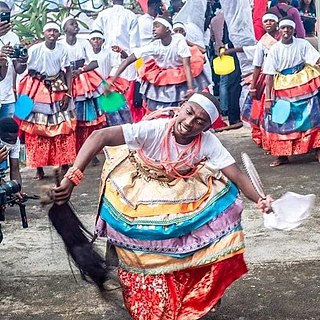
The Itsekiri are one of the fundamental Yoruba subgroups in Nigeria's Niger Delta area. They originate from Ile-Ife and speak a Yoruboid language and can be found in Ondo, Edo and Delta State. The Itsekiris presently transcends a population of over 1 million people and live mainly in parts of Ondo, Edo and majorly in the Warri South, Warri North and Warri South West local government districts of Delta State on the Atlantic coast of Nigeria.
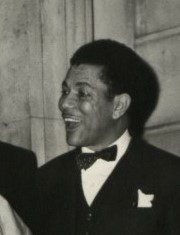
Chief Arthur Edward Prest was an Itsekiri politician of biracial heritage from the Warri division of southern Nigeria.
The Itsekiri language is a major branch of the Yoruboid group of languages, which as a group, is a key member of the Volta–Niger sub-family of the Niger–Congo family of African languages. Itsekiri is spoken by nearly 900,000 people in Nigeria as a first language and by many others as an additional language notably in the Niger Delta and in parts of Edo and Ondo states of Nigeria. The other key members of the Yoruboid group are Yoruba and Igala along with the various Yoruba dialects spoken in Benin and Togo.

The Kingdom of Warri, Warri Kingdom or Iwere Kingdom, was established in 1480, was part of the Nigerian traditional states its ancestral capital is based in Ode-Itsekiri, Warri South LGA, Delta State, Nigeria with a palace erected in 1950s in the heart of the city of Warri, Warri South LGA, Delta State, Nigeria.

Erejuwa II was a Nigerian traditional title holder and paramount leader of the Itsekiri who was Olu of Warri from 1951 to 1964 and from 1966 to 1986. He was the 18th Olu of Warri Kingdom with the title Ogiame Erejuwa II. He succeeded his father Ginuwa II as Olu. Ginuwa II was a great grandson of Olu Akengbuwa the last Olu who died in 1848, he was crowned in 1936 after an interregnum that lasted 88 years when Warri's political leadership was dominated by merchant princes.

Ikenwoli Godfrey Emiko was a Nigerian traditional ruler.

Olu Ginuwa was an Itsekiri king who was the first Olu of Warri. He was the eldest son of Oba Olua, the 14th Oba of Benin and Heir Apparent to the throne of the Great Benin Kingdom. He migrated from Benin Kingdom and was crowned the first Olu of Warri. He reigned for a period of 30 years. He reigned from 1480 to 1510. He was succeeded by his son, Olu Ijijen (Ogbowuru). Another of his sons, Olu Irame took over as king after Olu Ijijen joined his ancestors.

Olu Irame was a Nigerian traditional ruler who was the 3rd Olu of Warri. He was the second son to Olu Ginuwa and succeeded his brother Olu Ogbowuru as the 3rd Olu of Warri. It is stated that he banished the three gods and their worshipers from Ode-Itsekiri-Olu because of their incessant "noise-making". The gods and their worshipers moved to Orugbo, a community about 2 miles from Ode-Itsekiri-olu.
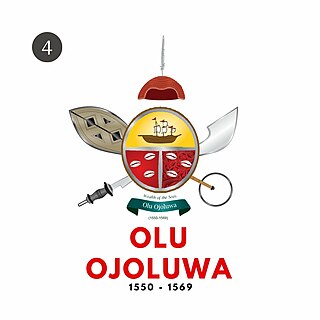
Olu Ojoluwa was an Itsekiri traditional ruler. He succeeded his father Ogiame, Olu Irame after his demise. He was crowned Ogiame Ojoluwa, the 4th Olu of Warri Kingdom at Ode-Itsekiri, the ancestral home of the Itsekiri. Olu Ojoluwa reigned for about nineteen years from about 1550 to 1569. During his reign, he commenced the process of integration of Ekpen's (Ekpenede) descendants of Okere with the local population in the kingdom.
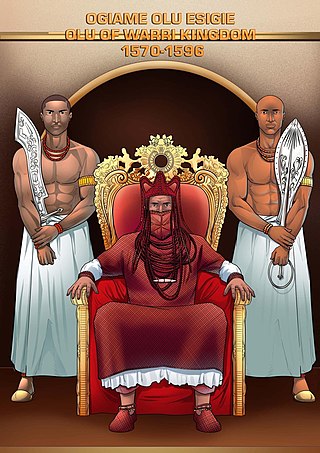
Olu Esigie was an Itsekiri traditional ruler. He succeeded his father Ogiame, Olu Ojoluwa after his demise. He was crowned Ogiame Esigie, the 5th Olu of Warri Kingdom at Ode-Itsekiri, the ancestral home of the Itsekiri. He ascended the throne of his father in 1570 and reigned until 1597, when he passed on. He was succeeded by his son, Olu Atorongboye.

Olu Atuwatse I was the 7th Olu of Warri who ruled over the Warri Kingdom. He was the son to Olu Atorongboye and succeeded his father Olu Atorongboye as the 7th Olu of Warri. He was initially home-schooled by his father and the Bishop in Ode-Itsekiri, which resulted in his ability to read and write in Portuguese. He was educated in Portugal from 1600 to 1611. He returned to Warri Kingdom as a graduate, making him the first graduate in Sub Saharan Africa Olu Dom Domingos was the second Christian Olu to rule Warri Kingdom. He married a Portuguese noblewoman, Maria Pereira, before returning to Nigeria with her in 1611.
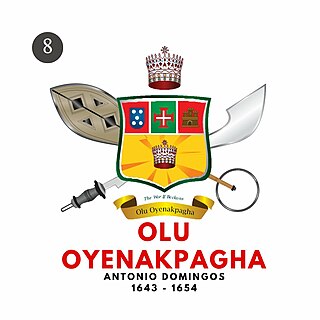
Olu Oyenakpagha was the 8th Olu of Warri who ruled over the Itsekiri people. He was named Omonighenren which translates to Prince with the golden skin. On ascension to the throne as Ogiame, Olu of Warri Kingdom, he was named Obanighenren which translates to King with the golden skin. His other name was Don Antonio Domingos. He was the son to Olu Atuwatse I and succeeded his father as the 8th Olu of Warri. He wrote a letter to Pope Clement X in 1652 which was delivered to the Pope successfully. He was educated at home and at an institute in Angola. Like his father, he married a Portuguese noblewoman. His son Olu Omoluyiri succeeded him.
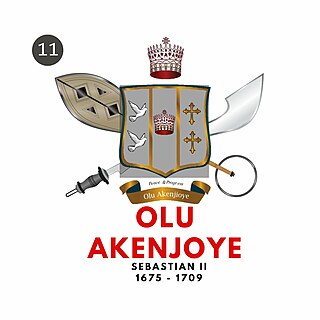
Olu Akenjoye was the 11th Olu of Warri who ruled over the Itsekiri and non Itsekiri people in the kingdom. He was the son to Olu Abejoye, the 10th Olu of Warri Kingdom. He succeeded his father as the 11th Olu of Warri. He took the title, Ogiame Sebastian II. He was succeeded by his son Olu Omagboye (Miguel).

Olu Atogbuwa was the 14th Olu of Warri who ruled over the Kingdom of Warri. He succeeded his father, Olu Akengboye as the 14th Olu of Warri. He took the title, Ogiame Atogbuwa. His Portuguese name was Manuel Octobia. When he went to be with his fathers, he was succeeded by Olu Erejuwa I around 1760.

Olu Akengbuwa was the 16th Olu of Warri who ruled over the Kingdom of Warri. He succeeded his father Olu Erejuwa I as the 16th Olu of Warri. He took the title, Ogiame Akengbuwa. He was also called Eyeolusan Joao. When he went to be with his fathers, there was a period of crisis following the death to the potential successors which was followed by a period of political Interregnum. His son Prince Oritsemone left Ode-Itsekiri during the period of the crisis to form Usele Community.

Olu Ginuwa II was a Nigerian traditional title holder and paramount leader of the Itsekiri who was Olu of Warri from 1936 to 1949. He was the 17th Olu of Warri Kingdom with the title Ogiame Ginuwa II. He was born Emiko Ikengbuwa. He succeeded his grandfather Olu Akengbuwa as Olu of Warri after an interregnum that lasted 88 years when Warri's political leadership was dominated by merchant princes.

Olu Atuwatse II was a Nigerian traditional title holder and paramount leader of the Itsekiri who was Olu of Warri from 1987 to 2015. He was the 19th Olu of Warri Kingdom with the title Ogiame Atuwatse II. He was born Godwin Toritseju Emiko. He succeeded his father Erejuwa II as the Olu of Warri. He was a lawyer by profession and was a recipient of the Commander of the Niger (CON) award from the Nigerian Government. He died in 2015 and was succeeded by his brother Ikenwoli.
Ode-Itsekiri is a community in Warri South Local Government Area of Delta State, Nigeria. It is also called Itsekiri-Olu and Big Warri. It is the capital of the Itsekiri people and one of the first autonomous communities before the crowning of the Olu Ginuwa. It existed long before 1480, with exact data not known. The Olu's Palace in Ode-Itsekiri has always been used to crown the Olu of Warri Kingdom, while the Kings are buried at Ijala-Ikenren Community.

Ogiame Atuwatse III is a Nigerian traditional king of the Kingdom of Warri in the Delta State. He was born Utieyinoritsetsola Emiko, also known as Tsola Emiko, on April 2, 1984 to Olu Atuwatse II, the 19th Olu of Warri, and Gladys Durorike Emiko. He is also a descendant of Olu Akengbuwa.
Ureju Community is an indigenous Itsekiri rural community in the Warri Kingdom. Ureju Community is one of the aboriginal five communities that make up the Warri Kingdom before the coming of Olu Ginuwa I alongside other Itsekiri communities like Ugborodo, Ode-Itsekiri (Okotomu-Irigbo), Inorin and Omadino. It is located in the Benin River axis of Warri North Local Government Area of present-day Delta State, Nigeria. Ureju Community has two main families - Olero and Kokolo.

















